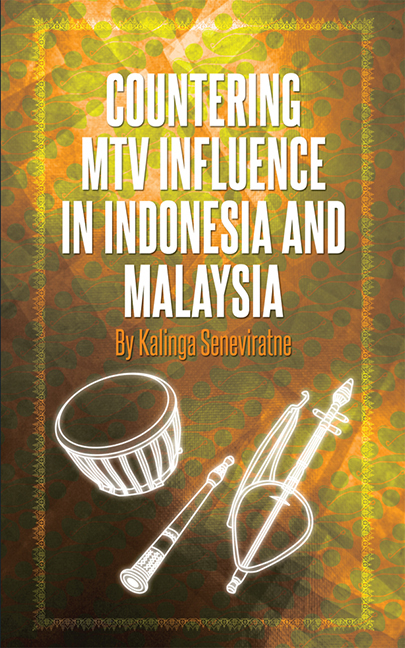Book contents
- Frontmatter
- Contents
- Preface
- 1 Introduction
- 2 Malay Cultural Landscape and Identity: Malaysia and Indonesia
- 3 Music, Islam, and Modern Cultural Identities
- 4 Pop Music, Cultural Imperialism, and Localization
- 5 Case Studies
- 6 Countering Cultural Imperialism: Theoretical Analysis
- References
- Index
- About the Author
3 - Music, Islam, and Modern Cultural Identities
Published online by Cambridge University Press: 21 October 2015
- Frontmatter
- Contents
- Preface
- 1 Introduction
- 2 Malay Cultural Landscape and Identity: Malaysia and Indonesia
- 3 Music, Islam, and Modern Cultural Identities
- 4 Pop Music, Cultural Imperialism, and Localization
- 5 Case Studies
- 6 Countering Cultural Imperialism: Theoretical Analysis
- References
- Index
- About the Author
Summary
Very often when people talk about the impact of MTV in developing countries, the process is described as a form of “cultural imperialism”, which has the potential to destroy local music industries and traditional culture, and westernize the local youth.
In this study one of the areas I focused on was the popularity of a genre of Islamic music in the region known as nasyid and its relationship to the MTV-generated music formats, formulas, or cultural trends. In the course of this research I interviewed many nasyid music groups in Malaysia and Indonesia, some of whom have gained pop star status in their country.
One such group is Snada, an Indonesian nasyid group whose latest album Neo Shalawat (released in 2004) has sold over 400,000 copies. “We're involved in Jihad” they replied to my first question during a group discussion with members of Snada (Jakarta, 2004), about the role of nasyid music. Perhaps I may have raised my eyebrows in response to their statement, because their leader quickly added, “I know what you are thinking about… No, we are not in the business of killing non-believers like you. We use music in dakwah, to spread the word of God.”
He then went on to explain to me how they use music to convey the Islamic message and values to youth in their country, suggesting that traditionally in the course of propagating the religion, proselytizers would seek to persuade others — through speech — to “do something good”. Previously there were no alternative modes of delivering religious messages other than oral communication; thus, nasyid songs are an important vehicle for proselytizing. However, in the context of modern day Malaysia, nasyid songs are used more to promote Islamic values among the Muslim Malay youth, as you would note in the discussion in this chapter.
The Role of Islam in Forming Postcolonial Cultural Identities in Indonesia and Malaysia
As social scientists we accept that there are serious problems in traditional societies — not only Muslim, but also Hindu or Buddhist or indeed, even Christian — confronting or coping with the postmodern age.
- Type
- Chapter
- Information
- Countering MTV Influence in Indonesia and Malaysia , pp. 93 - 133Publisher: ISEAS–Yusof Ishak InstitutePrint publication year: 2012

